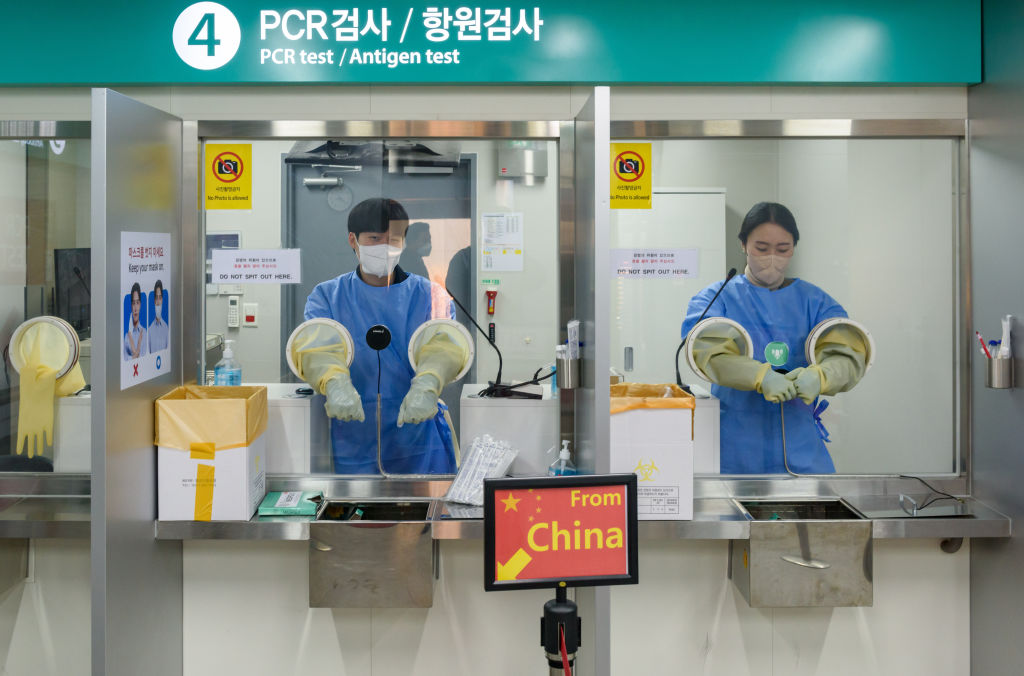
China has suspended issuing some visas for South Korea and Japan in Beijing’s first retaliation against Covid-related curbs on Chinese travelers.
Chinese consulates in South Korea will stop issuing short-term visas for visits, business, tourism, medical care, transit and personal matters from Tuesday, the Chinese Embassy in Seoul said in a statement. The suspension will be adjusted if South Korea removes its “discriminative inbound restrictive measures” targeting China, it added.
Beijing has also stopped issuing visas to China-bound travelers from Japan as of Tuesday, according to a spokesperson for a major Tokyo travel agency who asked not to be identified because of the sensitivity of the matter.
The halt was earlier reported by Kyodo, citing unidentified people in the travel industry. The Chinese embassy in Tokyo wasn’t available for comment after normal business hours.
The moves represent China’s first attempt at retaliation after a raft of nations recently implemented testing requirements for travelers from the country. The dismantling of China’s Covid Zero policy after almost three years has sparked a deluge of infections that, combined with a lack of information about how many people are sick or dying, has raised concerns over the possibility that new virus strains will emerge.
Read More: As Chinese Tourists Prepare to Travel Again, Some Countries Close Their Doors
Limiting visas issued to travelers from the two countries will markedly diminish China’s hopes of a recovery in inbound tourism after it scrapped travel quarantine earlier this week. Before the pandemic, South Korea and Japan were the two largest source of visitors to the world’s second-largest economy, according to the latest available data from the National Bureau of Statistics. In 2018, South Korean visitors made about 4.2 million trips to the country, followed by 2.7 million made by Japanese travelers.
Shares of some South Korean stocks linked to travel and tourism slid in afternoon trading, with cosmetics maker Amorepacific Corp. falling as much as 6.2% and Korean Air slipping 1.3%.
“The Korean government’s strengthened prevention measures for entrants from China are based on scientific and objective grounds,” Foreign Ministry spokesman Lim Soo-suk said in a briefing. “The government has been transparently sharing relevant information with the international community, and has continued to communicate with the Chinese side.”
The spat will likely rekindle memories of China’s decision to dramatically scale back trade with South Korea in 2017 after then-President Moon Jae-in agreed to host a US anti-missile system. Moon’s successor, President Yoon Suk Yeol, has in recent months raised Beijing’s ire by pledging to work more closely with the US, including expanding the missile shield.
South Korea said in late-December that it would require Covid tests for all travelers from China by end of February, and would limit short-term visa issuance until end of January. It also put the further increase in the number of flights from China on hold and directed existing flights to one airport.
China had warned earlier this month that it would hit back against such moves and Foreign Minister Qin Gang on Monday expressed concerns about South Korea’s travel curbs to his Korean counterpart Park Jin, according to the Chinese Foreign Ministry.
—With assistance from Kurt Schussler and Shinhye Kang.
More Must-Reads from TIME
- Cybersecurity Experts Are Sounding the Alarm on DOGE
- Meet the 2025 Women of the Year
- The Harsh Truth About Disability Inclusion
- Why Do More Young Adults Have Cancer?
- Colman Domingo Leads With Radical Love
- How to Get Better at Doing Things Alone
- Michelle Zauner Stares Down the Darkness
Contact us at letters@time.com